The Syrian war exposed the Syrians to unexperienced circumstances, and made them face “difficult” choices that they had been forced to adapt themselves to and accept at the expense of their social and psychological needs.
As a result of the aggressive bombing on the Syrian territories that are under the opposition factions’ control and the economic crisis the Syrian people face, migration has become a major cause of an internal tragedy, in addition to another tragedy beyond the borders.
A lot of Syrians, who lost their houses or migrated from their regions, have been hosted by some of their relatives in other regions, or shared houses with their brothers and parents. As a result, more than ten people might be found living in two-room houses.
Enab Baladi visited some of the Syrian houses to shed light on the phenomenon of house sharing where many families gather in one house and try to understand the reasons behind it and the negative effects it might engender.
Behind the Doors… Many Families Share Small Houses
For the sake of sheer gaming, Umm Mohammed’s 16 grandchildren squeeze all their feet on the carpet in the room. As the music plays, one of them passes his hand on the feet of his brothers and cousins. As the music stops, one of them receives a hit on one of his feet, and all the others burst into laughter.
Apart from playing, their gathering in front of the bathroom door waiting for their turn to use it often assumes an angry attitude that might even end up with disturbing the mood of the whole family.
The children’s grandmother, Umm Muhammad, is one of those women who moved from a relatively comfortable life in the city of Aleppo to the life of migration in the city of Idlib. She moved from her independent home to a home she shared with her five children and their families, this made her face a life style that she has never imagined she could experience.
“Our house consists of five rooms, each family lives in one room,” says Umm Muhammad to Enab Baladi. The rooms she talked about are isolated from each other by curtains, which made the spacious house look like a group of tents that are close to each other containing a mixture of events that are related to each individual and each family, making them look like an intertwined web, subjected to problems on a daily basis.
The case of Umm Muhammad’s family takes one back to the television series about the Levantine context, when different generations used to live in one house. At the end of the last century, this phenomenon had already started to gradually disappear from the Syrian society. However, after the Syrian war, it started to reemerge for reasons that relate to the difficult financial situations and migration between cities, and caused problems that the Syrian society had just started to overcome.
The decline in the economic situation of most of the Syrian people seems to be a direct cause which forced more than one family to live in one house. A study that was published by the United Nations in 2016 shows that 83 percent of Syrians are living below the poverty level while renting prices in Syria have increased by 300%. The average renting price for a house in the liberated areas such as Idlib is between 30 and 50 thousand liras in the more secure neighborhoods, while a two bedroom house rent in Damascus might exceed 100,000 Syrian Pounds.
Umm Muhammad says that the inability to afford the high rent prices forced her sons and daughters to live in one house, on condition that they share the expenses. She adds: “were it not for our cooperation, we wouldn’t have been able to live together in one single house”.
Sharing financial responsibilities does not necessarily mean sharing all the life details. Umm Muhammad explains that her sons’ families do not usually gather for lunch at one table, and each family often prepares its own meals and eats in its own room.
From a sociological perspective, this lifestyle might cause many short-term and long-term crises and problems. Dr. Ammar Baytar, who is in charge of mental health and psychological support at Syria Bright Future Organization, believes the lack of privacy to be the most important problem that families who live in one house might face, as a result of sharing the same kitchen, bathroom, and living room, hence total exposure to the other.
Within the conservative Syrian society, this “exposure to the other” may cause a major crisis especially for veiled women who wear hijab and who are forced to live with their cousin, brother-in-law, or one of their relatives. This limits their ability to move, as in the case of the 40-year-old lady Umm Abdullah, who talked to Enab Baladi about her suffering in a shared house and the ensuing loss of liberty that she and other ladies too had to go through.
According to Umm Abdullah, who lives in the city of Idlib, she and her family were forced to live with three of their relatives’ families for three months after they came from Aleppo, which forced her to wear the hijab even when asleep.
Israa Muezzin, a young lady from the city of Aleppo, suffered from the same problem. After leaving Aleppo, she was forced to wear her hijab for long periods while she lived with her family and four families in one house. Today, her situation improved as her family moved with her brother’s family to another house.
While Israa considers sharing one house with two families as more comfortable than sharing it with five families, her mother, Umm Ali, believes that the presence of her daughter-in-law in the same house she lives in requires special adaptation. She points out that she treats her daughter-in-law in a way that keeps the family away from problems, and she always tries to take into consideration the possible impact of what she would say to her, and how to advise her.
Many other families suffered from the existence of “the mother-in-law with the daughter-in-law” in one house, which caused problems that Thanaa Fattal, a Doctor and researcher in psychological counseling, said they are caused by “inherited cultural residues in our societies”.
The problems caused by shared family housing are not limited to the restriction of freedom and the reappearance of family problems, but specialists rather fear the effects of house sharing on children.
Even Umm Muhammad, who told Enab Baladi that her grandchildren often fight or dispute as a result of playing and joking, does not even see this as a serious problem but rather as something that is normal among children.
However, Dr. Ammar Baytar believes the residence of more than one family in one house makes children develop “aggressive” and “inappropriate” behavior as a result of “confusion of references to children”, since the child often does not often know where to take directions, orders, and advice, because the parents are often busy and thus they lose control over their children.
While the increase of problems in the houses is proportional to the increase in the number of people living in that house, Umm Mohammed insists that her situation is better than that of other families. She often tries to reduce the fear of the future, considering that “the life of migration is difficult for everyone, and adaptation is the only way to overcome this difficulty”.
Migration and Rising Prices Bring back the Epoch of “Bab Al-Hara” (The Neighborhood Gate)
The social problems caused by Syrian war have been discussed for a long time. However, the migration movement that different Syrian regions have witnessed has had a significant impact on the Syrian society. This deepened the fragmentation of some family ties and made others even worse.
As the Syrian people’s migration movement intensified to the more secure areas, several families were forced to live together in one house, and to bear the consequences and problems of collective shared housing.
Rent Prices are “High” and Law Implementation is “Low”
As the real estate sector is deeply affected by wars and migration, the real estate market in Syria has witnessed a significant increase in house prices and rents, both in cities and in rural areas.
In 2010, house rents in the rural areas of Damascus were between five and ten thousand pounds (the dollar then was equivalent to 50 Syrian liras), while prices in Damascus were between 10 and 40 thousand Syrian liras.
According to figures, after 2011, house rents increased by more than 300%, the average rent price of a house in Damascus reached 100 thousand Syrian liras, while in liberated areas such as Idlib it was between 30 and 50 thousand liras in the neighborhoods that were not being bombed while, before 2011, it did not exceed three thousand liras.
With the fall of the lira and the low wages in Syria, it has become difficult for one family, with an average per capita income of less than 35,000 lira to bare the burdens of expenditure amidst high prices, which forced several families to live together in one house to share rent and expenditures.
Adding to that, the owner’s requirement of a caution money pay for a six-month or a one-year period of the house rent made the matter even more difficult in light of the absence of a governmental authority which would regulate the relationship between the lessor and the lessee regarding the determination or duration of the rent.
There is no law that forces the owner of the house to adhere to a regulated price or tariff. Most of the real estate in Syria is subject to the will of the contractors under the saying: “the contract is the contractors’ law”.
So Many Migrants…and just a Few Houses
Six million Syrians migrated from various Syrian provinces because of conflicts which had been occurring in their areas since 2011 until the end of 2015, according to statistics of the United Nations High Commissioner for Refugees.
However, in a report entitled “They have no Choice”, the Syrian Network For Human Rights mentioned that until the beginning of 2017 more than six million Syrians were forcefully displaced from their original places of residence due to the agreements to evacuate the cities that were under the opposition’s control.
Reports say that most of the migrants escaped from Aleppo and the countryside of Damascus, and moved to the safe cities, which formed a population crisis that increased rent prices and reduced house offers due to the increase in demand.
Even if the family is financially stable, it sometimes faces a difficulty in finding an empty and equipped house, especially in the Syrian capital and the central cities, which forces the family to live with another family until it finds a house.
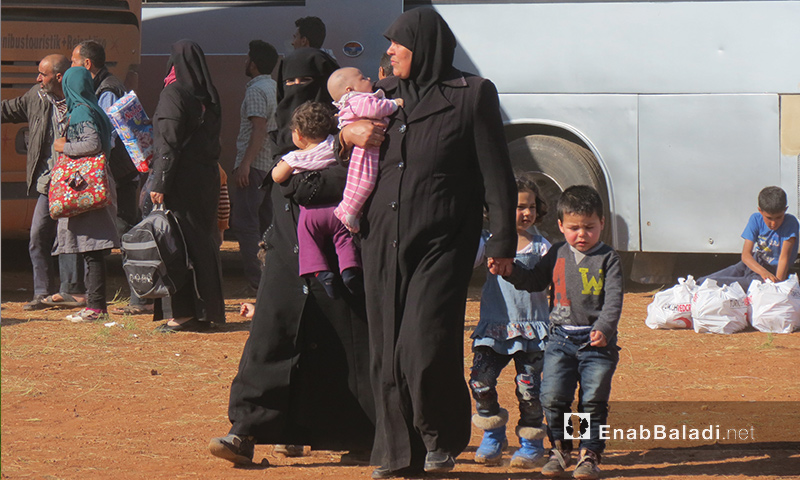
A mother and her children, who are originally from Homs, arriving to Idlib from Al-Waer neighborhood – 25 April 2017 (Enab Baladi)
The Problems are Many, but the House is just One
The Syrians might not have expected that most of them would be forced to live together in one house with people they used to visit once a week or even a month. This made them vulnerable to psychological stress caused by the war.
Just before 2011, and after young people married and went to live in separate houses from their parents to avoid the traditional problems between “the mother-in-law and the daughter-in-law”, the daughter-in-law had to live with her husband’s family, and the “mother-in-law” regained her power that she had lost for a period.
Since the late 1990s, young people tended to marry and live in separate houses because of the availability of houses that were away from the city centers and the possibility of applying for houses that were offered by the General Organization for Housing (Escan) as part of residential projects in the cities’ outskirts that enabled them to pay very low monthly installments.
Since the countryside areas were the ones that have been mostly affected by the conflicts, the sons were forced to go back to their parents’ houses with their wives and children, which caused family problems to resurface in society.
The children have significantly contributed in causing problems between brothers and daughters-in-law, since the problems that occur between the brothers’ offspring often turn into conflicts between the brothers themselves and their wives which might cause tensions and severe conflicts.
Other problems have taken place in the shared family housing, the most important of which is that veiled wives have been forced to stay at home and wear the hijab for a long time, since the wife is often forced either to cover her hair lest it should be exposed to her husband’s brothers or to stay in her room as long as they are in the house.
| 6 million Syrians migrated within Syria Until the end of 2015 (UNHCR) | ||
| 2.2: Damascus Suburbs | 1.2: Homs | 1.7: Aleppo |
Problems of Shared Family Housing
What did Psychologists and Sociologists Say?
The popular proverb says that differences are the “spice of life” and are normal within any family and do not necessarily have to be seen as a serious indicator. However, the association of these problems with semi-permanent conditions can result in a range of negative effects which, in turn, affects individuals.
In homes with more than one family that share natural bonds of blood, the area of disagreement is greater and the opportunities for expressing or discussing it are narrower, forming crises at the individual level of the population and at the family level.
Enab Baladi spoke with Dr. Ammar Baytar, in charge of Mental Health and Psychological Support at “Syria Bright Future” Organization, who noted the importance of highlighting and finding solutions to house sharing problems.
The Loss of Privacy in a “Conservative” Society
Dr. Baytar stressed that the psychological pressure suffered by people as a result of the circumstances of war, forced emigration and displacement is the basic cause of these problems, and pointed out that the feelings of anger prevailing in the Syrian society pushes people to take it out on each other and their children, for having failed to turn their wrath on the main cause of the situation of war.
He also said that people involved in the housing tumble their feelings on each other by looking for the mistakes of others and making accusations and prejudices.
He continued “For example, the sister could rebuke her nephew and accuse him of beating her son and stereotype her brother’s wife for being careless and indifferent,”, and all this because of what he called “her inability to release her anger at those who caused her to be expelled from her home.”
Baytar said that the most serious problem that families in one house face is the loss of privacy. He added: “Most of the families in Syria come from a conservative environment and have a specificity that is no longer controlled by the overcrowdedness inside one house.”
Families often share the same kitchen, bathroom, and living room, allowing for exposure to others and loss of privacy.
Children are the Ones who are Mostly Affected
According to international reports, Syrian children were the most affected by the conflicts and wars in Syria. The loss of their right to education and play and exposure to the conditions of siege and bombing and loss are but examples.
By drawing our attention to children who live with their relatives in overcrowded homes, we found out that their living conditions inside the house have increased their suffering and prompted them to adopt “aggressive” and “inappropriate” behavior.
Dr. Ammar Baytar said that children who live with their relatives for long periods of time may learn types of behavior that are not appropriate to their age while their parents have been too busy to realize they were getting out of their control.
“The child may learn bad words that he may have heard from a teenager older than him inside the house, and the teenager may learn to smoke from an adult who sees him every day,” which increases the problems among parents who keep accusing each other for not caring about the upbringing of their children.
Other problems might emerge when parents have their children live with their grandparents. What actually happens is that children often experience confusion and loss as to the increasing number of the people who control them and check their behavior.
Dr. Ammar referred to this situation using the expression “confusing references among children”. The child often does not know from whom to take directions, orders and advice and consequently becomes unable to make up his/her mind asking questions such as: “Whose words are more correct, my grandfather or my father, my mother or my grandmother?”.
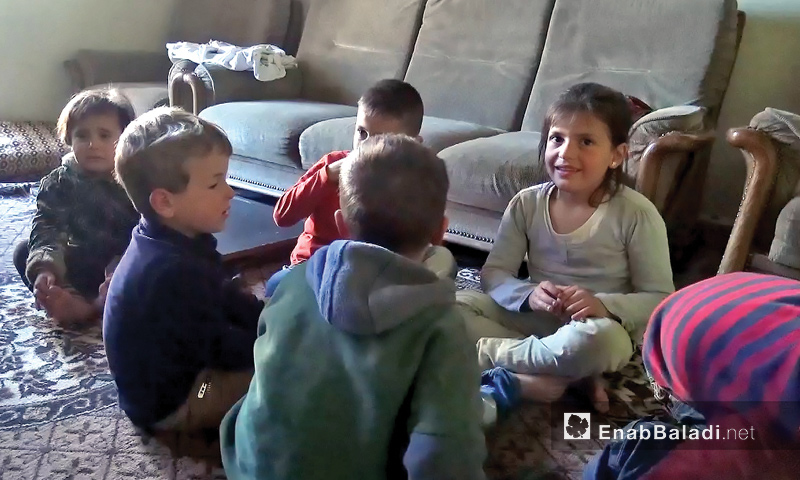
Children playing together in their home where five families live in Idlib – April 15, 2017 (Enab Baladi)
Raising Awareness among People as to the Actual Serious Conditions
Dr. Ammar Baytar stressed the importance of raising awareness among the Syrians about the current situation and its consequences. He said “We must alert people to the difficulty of the crisis they are experiencing and tell them about the problems they might face”.
He continued “The current crisis is putting pressure on economic resources and social relations and limiting privacy, so people should be aware of how to control their emotions under these pressures.”
Dr. Ammar advised the families living in one house to organize their tasks in order to avoid the meaningless problems that might just pump up their repressed anger and might be reasons for some more serious problems.
Cultural Sediments that “burst” to the Surface Again
Dr. Thanaa Fattal, the doctor and researcher in psychological counseling, attributed the problems of families to the economic pressures suffered by the Syrians, primarily in the search for “a living”.
She added to the list of problems “loss of privacy” and said, in an interview with Enab Baladi “When each family lived alone, it had an independent opinion and decision-making even in small problems, which it has lost after sharing housing and details of life with others”.
Dr. Thanaa noted that old problems have been exacerbated by the accumulation of cultural heritage in our societies, such as the problems of “mother- and daughter-in-law” that have been brought back to the surface of society with their home sharing of again.
These accumulations played a role in restricting the freedom of women inside the house in the case of house sharing with their husband’s brothers, especially with regard to the hijab. She continued “The veiled woman does not have the freedom of movement inside the home of her husband’s family, which may increase the problems between the husband and his brothers in case one of them saw her without a hijab.”
“There is No solution without Constructive Talk”
Dr. Fataal warned against the absence of “honest and effective” dialogues between families sharing housing, and called for searching for the logical causes of the dispute away from the anger that produces “improvised illogical” solutions.
She urged every member of the family to take their rightful place without “intruding” in anyone else’s affairs, especially with regard to the relationship between the wife and her mother-in-law as well as the need to respect the views and attitudes of others.
At the end of the conversation, she focused on the idea of referring to the “wise” family member who is resorted to by family members to solve their problems and to consult him about the appropriate solutions, a social habit inherited in the Syrian society.
House Sharing..Pros and cons
In light of the need to understand the causes and consequences of the phenomenon of shared family housing and its obstacles, Enab Baladi conducted an opinion poll in the governorate of Idlib, and our correspondent asked people about the pros and cons of having more than one family sharing one house.
Differences in Attitudes and Feelings
Umm Ali, a woman from Idlib, said that the most important obstacles facing people in house sharing are differences in attitudes, feelings, and opinions. They often find it difficult to agree on the “simplest subjects”, as each family used to live in a house with distinct food, sleep and hygiene habits.
Umm Ali pointed out that displacement from conflict zones and rising rent prices are forcing people to live in one house and stand their differences.
From his side, Yahya Ahmed Medlaj, a migrant from the city of Baba Amr in Homs, stressed the importance of family house sharing in the current circumstances of increasing prices and poor material conditions. He said when asked about the advantages of house sharing “it is important for poor families and it helps them in alleviating expenditures and sharing rents “.
As for the negative aspects, Yahya’s opinion did not differ from Umm Ali’s view that “the lack of understanding” among relatives is one of the most important social problems facing them, and he said that “The psychological pressure caused by the war makes people on guard against each other in the smallest things, so they have to understand each other more”.
“Children’s Problems Increase the parents’ Vulnerability”
Abu Hassan, a migrant from Homs governorate to Idlib, had a different opinion from his predecessors. According to him, the problems between children are transmitted to adults and impede understanding among them.
“If the uncle shouted at his nephew and rebuked him, the mother would be upset and would make a quarrel with her (sister-in-law of the husband),” he said, “but they are obliged to bear each other and live in one house.”
On the advantages of family house sharing, Abu Hassan said that people in wartime need people to talk to and “amuse themselves” with, and children need to play with their peers because they cannot play or go for a walk outside.
Nidal Ahmed, a migrant from Al-Wa’ar neighborhood in Homs to Idlib, said that the most important disadvantage of house sharing is restricting the freedom of women to move inside the house. He added “Women often have to wear hijab all the time.”
Nidal tackled the problem of hygiene and house chores among women. Each family has specific habits related to cleaning and cooking, and these differences might lead to small problems that pave the way for major ones.
“We must Overcome our Stress and Stand that of Others “
When people in Idlib were asked about how to overcome the problems of family house sharing, most attitudes united around the idea of respecting the opinion, cultures and differences of others.
According to Om Ali, the best solution to the problem is “not to scrutinize the actions of those we share the house with, to overlook their mistakes and to bear the conditions they are going through.”
She also recommended the need to understand each other and the distribution of tasks related to cleaning and cooking and the provision of the shared house needs.
As for Abu Hassan, he called on civil society organizations to raise people’s awareness about this social problem and support them psychologically to overcome the “pressures of war” and become more able to accommodate with others and their differences.
“Women’s Community Programs” to Address the Effects of Family house Sharing
“Vulnerable groups” (women and children) are often the most affected by security problems and wars, and this is clearly reflected in the methods of communication and responses. The economic and social pressures associated with the war place a heavy burden on women and lead to misbehavior when communicating with others, or it might cause different psychological problems.
Although women’s organizations and associations that are active in the Syrian territories offer periodic psychological support programs to women, they cannot cover all the cases and can accordingly become less effective and vain, according to Dr. Ammar Baytar, the coordinator of Mental Health and Psychosocial Support “Syria Bright Future” Organization.
Director of the Women’s Affairs Office of the “Rakeen” Organization in Idlib City, Wissam Maarri, told Enab Baladi that many of the women who came to the organization’s office suffered psychological stress as a result of sharing homes with more than one family.
She explained that the organization, through the Office of Women’s Affairs, organizes “awareness sessions and psychological support to understand the problems of women and help them solve these problems”.
She added that “Rakeen” has managed to provide a number of homes for families who do not have the money to rent a private home, easing the pressures of house sharing.
As to the women’s committee for Empowerment of Women and Children in Idlib, it discusses the problems of house sharing in awareness sessions on the “relationship between the migrant and the resident”. According to its director, Roula Shehadeh, these sessions aim to make women get rid of psychological stress and give them the opportunity to talk more about it.
Shehadeh pointed out that the psychological pressures are reflected in the behavior of women and their anger. She gave as example one of the women who attended an awareness session and who said she hit her son repeatedly without being able to control herself and who was given advice by the association to get rid of negative energy by practicing sports, cooking or handcrafts.
Although Dr. Baytar praised the great effort exerted by the associations and organizations in the Syrian territories, he considered that the concept of psychosocial support inside Syria is not presented properly and within the criteria of mental health. Psychosocial support activities must be subject to pyramid standards according to the “Emergency Interference Pyramid “, which focuses primarily on providing basic services to people such as housing, clothing, food, health care and others.
As a second step, there should be provision of support to the family and members of society, through the organization of recreational and sporting activities and the activation of social relations, which is something that the Syrians lack at home.
if you think the article contain wrong information or you have additional details Send Correction
النسخة العربية من المقال
-
Follow us :











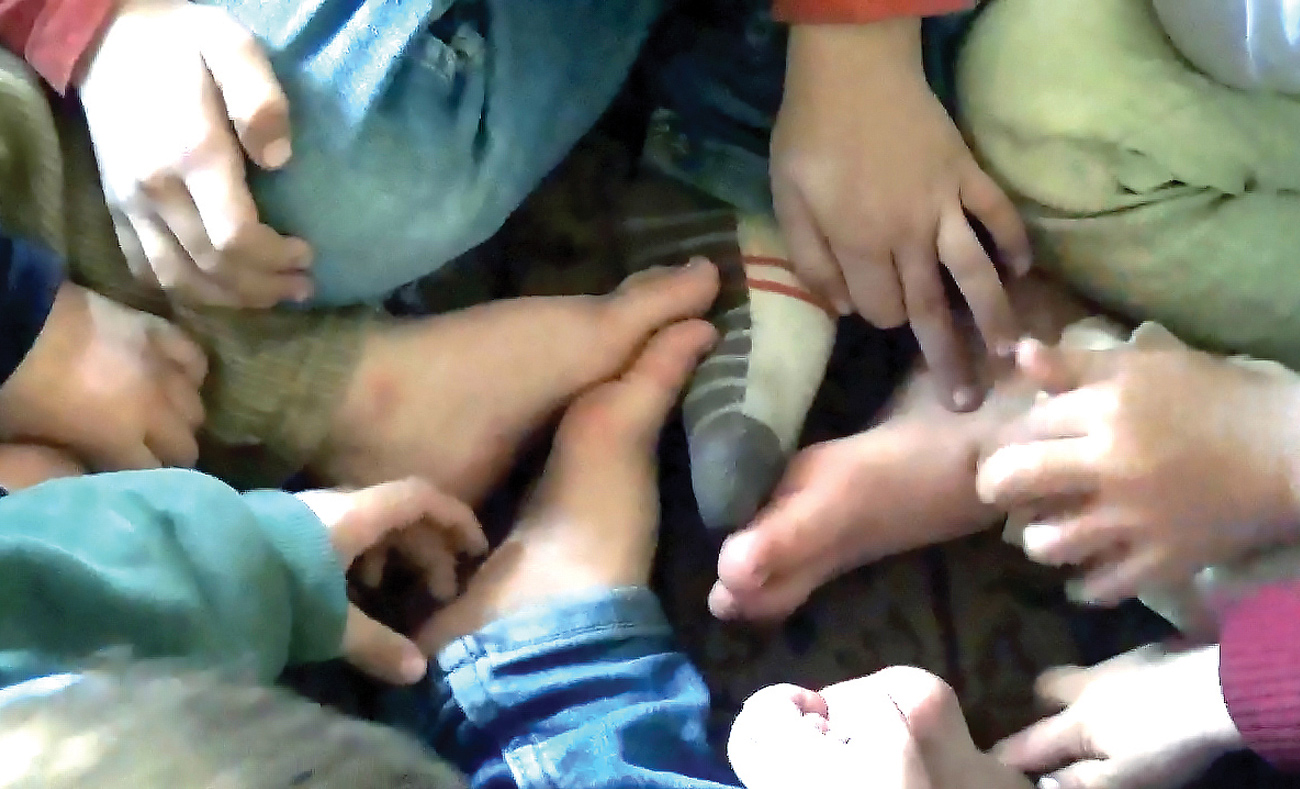






 A
A
A
A
A
A

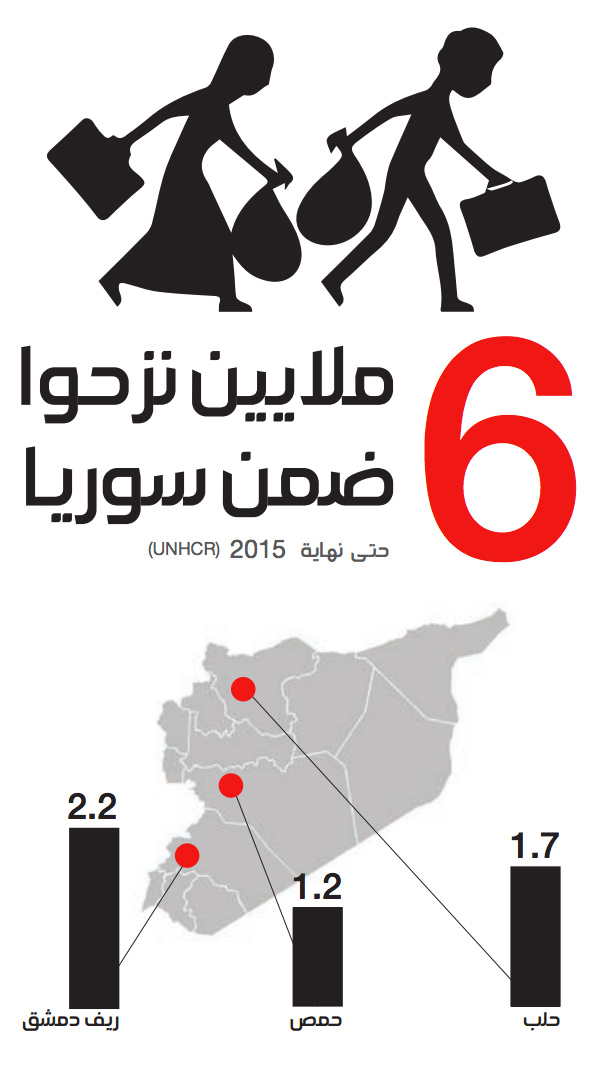






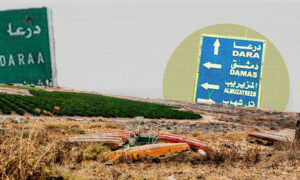
 More In-Depth
More In-Depth